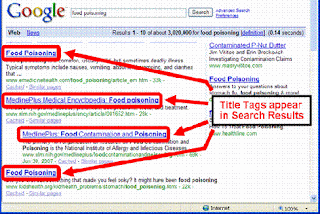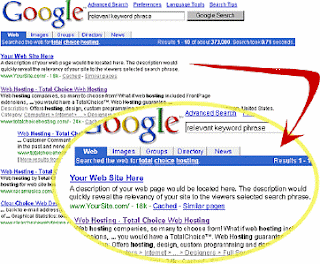





SEO is such a hot topic these days. How do you get your web site within the first page or two of the search engines? How do you increase your Google page rank?
However, there are some simple things you can do when building your site that will help increase your site chances of having good results. In no particular order, below are 10 of these items…
1. Title Tag : The TITLE tag should be kept between 60 - 90 characters in length. I've consider many conflicting reports on TITLE length, but a good practical tutorial guide is Google. In search results, Google currently displays only approximately 65 characters of the title - some engines display more. Keeping this in mind, have the most important keywords at the beginning of your title.
2. Meta Tags : The Meta tag in html is not a required tag when you're creating your web pages; many pages don't use the tag at all, and I must confess that I've not used it on my home page, although I put it into this page by way of demonstration. To put it briefly, the meta tag is only used by search engines to permit them to more accurately list your site in their indexes. Sometimes.
3. Proper Use of Heading Tags : H1 should be used for the top level headings, so depending on it's context h1 should then be followed by the sub heading h2, then h3 and so on.Using an h1 for the main heading on the page, such as contact us is the way I would go.
4. Alt Attributes on Images : In Internet market its very important to Optimizing images in SEO (Search Engine Optimization) for websites. The ALT attribute is a critical step that is often overlooked. This can be a lost opportunity for better rankings.
5. Title Attributes on Links : The title attribute can be used on nearly every element and is even compulsory on several Frames.
6. XML Sitemap : XML Sitemap automatically creates a site map that conforms to the specification. This helps search engines keep their search results up to date.
7. Relevant Content : Relevant Content is very critical to achieving effective Internet marketing strategies and is the key to the implementation of organic search engine optimization. Web Page Content should always be Unique and focused directly on the product or services that are being promoted.
8. Link Building : Without proper link building, your site will not rank competitively. Plain and simple. According to Google, "webmasters can improve the rank of their sites by increasing the number of high-quality sites that link to their pages".
9. Social Media : In Today Social Media is a moderated online business community for Social Media blogger, marketers, PR, and media professionals.
10. A Few SEO Don’ts — Flash and Splash : By Flash and Splash we can create animated text effects - such as intros, splash screens and banners for your website- fast and easy. It is a very compact tool based on a wide range of animation templates.
SEO Services India with Link Buying
 Question : To buy or not to buy; that is the question in link building today.
Question : To buy or not to buy; that is the question in link building today.
By John Lessnau. He's the owner of LinkAdage and LinkXL and always gets asked, "should I buy links? What links? Will I get banned?"
But he narrows it down: if you buy links, what kind of links should you buy?
It depends - how old is your site? If you have an older site that has a lot of links which count in Google, you can slip in a few extra links.
How many links do you have now? If you have tons, it's easier to slip in a few paid links.
Are you happy with your website traffic? Some people buy links in lots of websites even though they're ranked high position for the big search term. Don't take that risk.
What is your risk tolerance today? There's a big risk/reward deal with buying text links today. There's one site out there that ranks #1 for a competitive key word and they're buying all kinds of backlinks like Russian, Chinese, etc.
Do you get natural links for your websites? If you're getting tons of natural links, don't buy links. As people to link to you and change the anchor text that works for you a little bit better. If they like your site enough, maybe they'll listen.
Is your site come under the radar? Are you selling toenail clippers and want to rank on the front page? You might be able to buy 5 links and get in the front page. But on the other hand, if you're in the competitive areas like Rx, casinos, mortgages, it will take too much harder.
Why buy we links in today?
- It's the only realistic way to get decent links
- Shortcut to better natural rankings: if you're willing to take the risk, there can be great rewards.
- Instant gratification
- Hopelessness
- Keep up with the competition
- PR envy
What kind of links should you buy in today?
- Well, don't go to pages that has unrelated links that has an "Add URL" link added.
- Don't go to PR8 sites with contextual links that have descriptions.
- Do go to links that fit among the content.
- Here's a site that screwed up: PR7 and sells links at $100/month. The next week, it had more links and was a PR5.
Way to find paid Link :
- Check site back link by this method
link:http://www.xyz.com (Go to first in Google search engine)
- Check site cached page by this method
site:http://www.xyz.com (Go to first in Google search engine)
 Lets make a list of tips for link building. I’ll start the ball rolling, by the end of comments I will compile the top 20 tips so you too can become a professional link builder.
Lets make a list of tips for link building. I’ll start the ball rolling, by the end of comments I will compile the top 20 tips so you too can become a professional link builder.
1) Check out backlinks to your competitors website, make a list of these links and by the time you have researched a number of sites you should start to see a pattern emerging.
2) When negotiating links, think very carefully as to the angle you will approach the webmaster with. OK, that link may benefit you, but what does he/she get in return ?
3) What methods will you employ to make sure the links remain on your chosen site ?
4) ( I always struggle with this one) Determine if the site is a good linking partner. What’s the nature of the site? What impact will it have on your site if you link to it ? Who owns the site ? ( Some people such as Dave get a gut feeling about a site, but here we need to establish a definite method for filtering out the crap)
Improve Link Popularity in 10 Easy Steps
 You've spent the last few months optimizing your web site. You did your homework and learned all about optimizing techniques for your web page. Your relevant keywords are prominently placed in all the right places on your pages. Yet your site still isn't ranking the way you want. What do you do?
You've spent the last few months optimizing your web site. You did your homework and learned all about optimizing techniques for your web page. Your relevant keywords are prominently placed in all the right places on your pages. Yet your site still isn't ranking the way you want. What do you do?
It's time to improve you link popularity!
What think about brother ? Why you with link building? Link popularity and link quality are very important because every major search engine like Google , Yahoo & MSN now considers them as a part of their ranking algorithms. If you don't have links, you won't rank well for competitive keywords.
If your page includes all the important on-the-page criteria and scores well with Page Primer, it's time to focus on your all links. Good inbound links can move your page up the ranking ladder to your website and act as new entry points. But how does your site get those coveted inbound links we hear so much about?
First off, let's make sure we understand the basics. Link popularity is the measure of inbound links to your web site. Link analysis evaluates which sites are linking coming to you and the link text itself.
Fortunately, there are a lot of ways to improve your link quality and popularity, which will give you a boost in the rankings. Here are some guidelines to improve your own linking campaign:
1. Prepare your site first
Before you start your link building campaign, take time to get your site in shape. Make sure your site looks professional, has good content and is easy to navigate. Validate your HTML code and check your links with a tool like HTML Toolbox. If a potential linker goes to your site and finds broken pages, they are not going to want to link to you.
In addition, directories have gone on record saying they may exclude sites with broken links and page errors. Directories want only professional looking sites in their databases, so do your homework on your site before you start promoting it and your linking campaign will be more effective.
2. Budget time for link building
Don't expect to grow your link popularity overnight. Budget time every week to work on link building. If you force yourself to spend a couple hours a week on link building, it will become part of your routine. Pick one day a week and set aside time as your "link building time." If you don't make it a priority, it won't get done.
Link building is an incremental activity. Over time these one or two new links start adding up until they are hundreds or even thousands of links.
3. Establish realistic link goals
Don't expect to see instant results. Link building is difficult, frustrating and time intensive. Convincing another web site to link to you can be exasperating. If you get one good quality link a month you're doing better than the majority of sites out there.
Patience and creativity are key to link building. Track your progress so you know who you've asked already. It could be embarrassing to ask a site for a link if they've already given you one.
If a company initially declines your link request, wait a while and then ask again. Their company focus may change over time. A "no" today may change into a "yes" 6 - 9 months later.
4. Develop internal management support
If you're link building in-house, build support from your company's internal management for your link building. This usually means educating management about the benefits of link building.
Link popularity is unique to the search engine industry - it's not taught in graduate schools (not yet, anyway). Sit down with your management and explain the concept behind link building - don't assume they understand it or have even heard of the term. In fact, most won't have a clue what you're talking about.
Explain link building in terms they will understand and in ways that will get their attention, such as describing the relationship of link building and increased revenue. Talking about making more money usually gets management's attention.
Why worry about management support? You will need it to provide the time and money you need to get into search engines or directories.
5. Link popularity is all about quality
Be selective about the sites from which you request links. Search engines use sophisticated rules when judging the importance of a link, and the popularity of the site linking to you is a key criteria. One link from CNet is worth far more than a link from a personal web site.
And don't even think of using a link farm! Link farms are sites that exist solely to link to other web sites. Link farms are a blatant attempt to inflate your link popularity, and search engines take a dim view of them. Google in particular has been known to ban sites found using a link farm.
Try to identify non-competitive sites in the same field as your site. Links from sites that are related to your area carry more weight than sites from Aunt Sue's favorite horse site. That doesn't mean you should refuse a link from Aunt Sue, just be aware it won't help you much in link quality terms. On the other hand, links from sites within your industry are strong endorsements for your site.
6. Develop a relationship with a site
Before you ask for the link, get to know the web site. Establish yourself as a real human first. That way, when you ask for a link, it's harder for them to say no.
Impersonal broadcast emails asking for links are spam. Sure, it's easier, but it will only result in making another company mad at you. Spam link requests do not work and waste everyone's time. Don't do it!
7. Provide the linking code
Make it easy for other sites to link to you. Send the prospective linker the exact HTML code you want in the link and suggest which page you want the link from. This ensures the right words are used in the link and reduces the burden in setting up the link. Everybody on the Internet is pressed for time and if you don't make it "drop-in simple" by giving them the exact HTML, you've made their job too hard. Make it easy and your success rate will go up.
8. Get directory listings
Jumpstart your link campaign by getting directory links first. This is especially important if you have a new site or a site with no inbound links. A shortage of inbound links puts your site at a severe disadvantage because link analysis is an important part of every search engine's ranking algorithm.
The way to overcome this disadvantage is to get a few quality links. A good way to start is to get listed in as many directories as you can. There are many directories out there, and the more you can get into the better.
A few to target include:
* Open Directory
* Yahoo
* LookSmart
* Zeal.com
* Joeant.com
* Business.com
Be aware that most of these directories require you to pay for a listing. It's worth the expense.
9. Consider bartering for links
It's a good idea to have something to offer in return for a link. Many sites won't link to you unless you link back to them or otherwise make it worth their while. Create a Resources or Partner page that allows you to have a place from which you can easily link to them.
You might also offer to work a barter arrangement with them. If you have a popular site with their target market, they might consider free advertisements in exchange for a link. If the link is of great value to you, be prepared to give something back.
10. Link building alternatives
If time constraints keep you from link building, consider outsourcing your link popularity work. Link building is undoubtedly the most time consuming part of search engine optimization. You may find it is not cost effective to do it in house. That doesn't mean you shouldn't do it, it just means you hire someone else to do it for you.
Many top SEO firms have turned to outsourcing this function. For example: Jill Whalen of highrankings.com uses Debra O'Neil-Mastaler's link building firm.
Outsourcing to a reputable link building firm ensures good links and could be a more efficient model for you if you are already time limited.
One word of caution if you do chose to hire a company specializing in link building: make sure any firm you hire follows good link building practices. Ask them to describe the process they use to request links Make sure they follow a personalized approach, and don't simply spam sites with requests for links.
If they refuse to discuss their link building methods you can assume they use impersonal widespread email drops or link farms - that's spam. They may call it a fancy name, but if the process involves sending out large numbers of form emails, it's still spam and will only set your campaign backwards and injure your company's professional reputation. Go find a different company or develop your links in house.
Just do it!




















